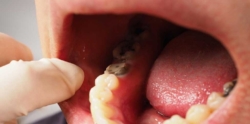Tooth enamel loss is a common problem nowadays. Due to our unhealthy diets, it’s rare to find a person without any enamel erosion. If you’re interested in fixing your enamel with dental veneers in Mount Prospect, IL, look no further than Simply Teeth. Their dentists have years of experience in doing teeth veneers and many other dental procedures. If you want to learn more about tooth enamel loss, how to prevent and treat it, read on.
What Is the Tooth Enamel?
Enamel is a thin layer that covers your teeth. It’s the hardest tissue found in the human body, and its purpose is to protect the teeth from damage. The enamel covers the whole visible part of the tooth, otherwise known as the crown. When it’s healthy, the enamel is translucent. That means the white color of teeth comes from the dentin, part of the tooth that sits underneath the enamel.
Your teeth are quite sensitive to damage, and the daily wear and tear would lead to fast deterioration if it weren’t for the enamel. It protects the teeth from damage due to daily chewing, grinding, and biting. Additionally, it insulates the teeth from chemicals and cold or hot temperatures.
However, the enamel can also crack or chip quite easily. Once it does, the damage stays on the enamel forever. Stomach acid and other acid types can then further destroy the enamel, leading to deterioration. Additionally, the enamel can stain quite quickly, as well. Dark liquids such as coffee, red wine, or tea, along with cigarettes, are the top causes of enamel stains. In order to remove these stains, you should visit a dentist for a cleaning and polishing checkup.
What Causes Tooth Enamel Loss?
Tooth enamel loss is most often caused by acid wearing down the enamel. Therefore, energy drinks and various juices can cause quite a bit of damage to it. That’s because these drinks contain high levels of citric, phosphoric, and other types of acid.
Additionally, diseases such as GERD or bulimia can also lead to erosion. The main symptom of GERD, or acid reflux disease, is an excess of stomach acid that ends up leaking into the esophagus and mouth. Similarly, the frequent vomiting associated with bulimia leads to stomach acid buildup on the teeth.
Additionally, various medications can aid in tooth enamel loss. Antihistamines and aspirin are especially damaging. Genetics can also aid in the decay, as it can cause conditions such as xerostomia, otherwise known as dry mouth. And lastly, environmental factors such as stress, tooth friction, and wear and tear of the teeth also aids in enamel loss.
The Symptoms of Tooth Enamel Erosion
Enamel loss can be difficult to notice. Many don’t pay attention to the symptoms or end up ignoring them in their day-to-day lives. However, dismissing the symptoms of teeth enamel loss will only make the problem worse. If you notice any of these symptoms of enamel erosion, you should contact your dentist as soon as possible.
Tooth sensitivity
Certain types of food, such as candy and chocolate, can cause sharp pain to your teeth. Additionally, your teeth can be sensitive to overly hot or cold foods. As the enamel loss progresses, your teeth will become more sensitive to foods and temperatures. Less extreme temperatures may cause sharp pain, and the pain may become more extreme.
Discoloration of the teeth
Once the enamel erodes, it leaves the dentin exposed. Therefore, it will be much easier for food and drinks to discolor it. If you notice sudden tooth discoloration, you should contact your dentist. The most likely reason is enamel erosion, and the teeth will likely continue to change color until you fix the issue.
Tooth chips and cracks
Cracking and chipping of the teeth is also the result of enamel deterioration. Since the enamel can no longer protect your teeth, they will be more prone to breaking. If you notice the edges of your teeth are irregular, jagged, or rough, your enamel has most likely sustained damage.
Tooth cupping
Tooth cups are small indentations in your teeth. They are caused by erosion, and they can be a breeding ground for bacteria. Additionally, they look unappealing, which may impair your self-confidence.
How to Prevent Tooth Enamel Loss
Enamel protection is the number one way to prevent erosion. If you want to protect your enamel, brushing your teeth twice a day with fluoride toothpaste is essential. Additionally, you should floss every day and use an antiseptic mouthwash. However, don’t overuse the mouthwash, as too much of it can have the opposite effect.
If you’re prone to tooth issues, it’s smart to eliminate sugary or highly acidic foods from your diet. Avoid carbonated drinks, energy drinks, and citrus fruits. Similarly, try to snack on sweets as little as possible. Better yet, monitor your overall snacking throughout the day. Frequent eating can lead to tooth decay, as the mouth remains acidic for a few hours after you eat, especially if the food is high in starches and sugar.
Make sure you drink enough water, as well. Drinking water will make you less hungry throughout the day, meaning you won’t snack as much. Additionally, the water will clean your teeth from acid buildup throughout the day. If you have a dry mouth, drinking a lot of water is especially important. If you need to drink coffee or an energy drink, use a straw. These liquids are much less likely to stain your teeth or damage the enamel if they don’t come in direct contact with them.
Tooth Enamel Loss Treatment
There’s only so much you can do to prevent tooth enamel loss. If your teeth are already affected by erosion, the best thing you can do is prevent it from spreading further. Luckily, nowadays, you can choose from a variety of dental treatment options. Firstly, you can get a dental crown, which will cover the tooth and protect it from further damage.
Secondly, you can get cosmetic bonding. A quick and inexpensive process, cosmetic bonding is a great way to deal with minor tooth enamel loss. However, if the loss is extensive, it won’t do much to protect your teeth. If that’s the case, you should go with dental veneers.
Teeth veneers are thin shells that the dentist adheres to your tooth. They are a great treatment option for enamel loss, as your teeth will both look beautiful and won’t continue to deteriorate. If you’re interested in veneers, you can read more about them in this article.
In Conclusion
You shouldn’t ignore the signs of tooth enamel loss. If you notice tooth sensitivity or discoloration, contact your dentist immediately. They will know how to proceed with the treatment before the problem becomes bigger.






